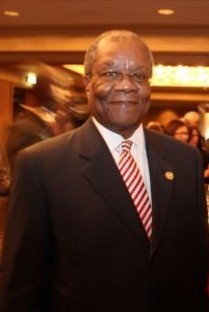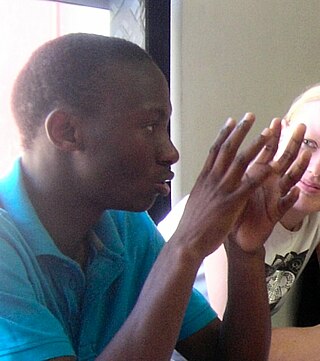Related Research Articles

Artifacts indicating human activity dating back to the early Stone Age have been found in the Kingdom of Eswatini. The earliest known inhabitants of the region were Khoisan hunter-gatherers. Later, the population became predominantly Nguni during and after the great Bantu migrations. People speaking languages ancestral to the current Sotho and Nguni languages began settling no later than the 11th century. The country now derives its name from a later king named Mswati II. Mswati II was the greatest of the fighting kings of Eswatini, and he greatly extended the area of the country to twice its current size. The people of Eswatini largely belong to a number of clans that can be categorized as Emakhandzambili, Bemdzabu, and Emafikamuva, depending on when and how they settled in Eswatini.

Mswati III is the King of Eswatini and head of the Swazi royal family. He was born in Manzini in the Protectorate of Swaziland to King Sobhuza II and one of his younger wives, Ntfombi Tfwala. He was crowned as Mswati III, Ingwenyama and King of Swaziland, on 25 April 1986 at the age of 18, thus becoming the youngest ruling monarch in the world at that time. Together with his mother, Ntfombi Tfwala, now Queen Mother (Ndlovukati), he rules the country as an absolute monarch. Mswati III is known for his practice of polygamy and currently has 15 wives.
King Mswati II (Born:1820–Died:1868), also known as Mswati and Mavuso III, was the king of Eswatini between 1850 and 1868. He was also the eponym of Eswatini. Mswati is considered to be one of the greatest fighting kings of Eswatini.
Labotsibeni Mdluli, also known as Gwamile, was the queen mother and queen regent of Swaziland.

The People's United Democratic Movement is the largest opposition party in Eswatini. It is a democratic socialist party. Formed in 1983 at the University of Eswatini, it is led by Mlungisi Makhanya. The Swazi government has been monitoring PUDEMO closely since it launched the Ulibambe Lingashoni campaign, which aims for a "total liberation" of Eswatini, and has recently cracked down heavily on even small manifestations of support for PUDEMO, such as the death in custody of PUDEMO member Sipho Jele, who was arrested for wearing a PUDEMO t-shirt in May 2010.
Mario Thembeka Masuku was a Swazi politician who was the leader of the People's United Democratic Movement (PUDEMO), Eswatini's banned opposition party.

Prince Barnabas Sibusiso Dlamini was a Swazi politician who served as Prime Minister of Eswatini, from 1996 to 2003 and again from October 2008 to September 2018.

Christianity is the dominant religion in Eswatini. The relative prevalence percentages vary by source. According to Pew Research, over 88% of the total 1.2 million population of Eswatini express Christianity to be their faith, over 0.2% express no affiliation. According to the US State Department religious freedom report of 2012, local religious leaders estimate that 90% of Eswatini's population is Christian, 2% are Muslim, while under 10% belong to other religious groups. According to the CIA World Factbook, the distribution is 40% Zionist, 20% Catholic, other Christians 30%, 2% Muslim and 8% other religions. In other sources such as Clay Potts, the religious demographics are 80% Christian, and 20% Islam and Traditional Swazi religion.
HIV/AIDS in Eswatini was first reported in 1986 but has since reached epidemic proportions. As of 2016, Eswatini had the highest prevalence of HIV among adults aged 15 to 49 in the world (27.2%).
Jan Sithole was a Swaziland trade union activist and politician. Sithole was president of the Swaziland Democratic Party (Swadepa), and was in October 2013 elected to the House of Assembly of Eswatini. He passed on the 12th of September 2020.
John June Nquku was an early Swaziland nationalist and creator of Swaziland's first political party, the Swaziland Progressive Party.

Sipho Jele was a member of the banned Swazi political party People's United Democratic Movement (Pudemo) as well as the Swaziland Agricultural and Plantations Workers Union (SAPWU), part of the Swaziland Federation of Trade Unions (SFTU). He died in police custody in Swaziland, after having been arrested on 1 May 2010, at the SFTU May Day celebrations, for having worn a T-shirt with a Pudemo logo. Sipho Jele was found hanging from the rafters of a toilet at the Sidvwashini Correctional facility where he was being held on 4 May.
Pius Vilakati is a Swazi democracy activist, as well as the former President of the University of Swaziland Student Representative Council (SRC) and a former prominent member of the Swaziland National Union of Students (SNUS).

Maxwell Dlamini is the Secretary General of SWAYOCO and the former President of the University of Swaziland Students Representative Council. During the so-called "April 12 Swazi Uprising" in April 2011, he and fellow activist Musa Ngubeni were arrested on charges of possession of explosives under Sections 8 and 9 of Swaziland’s Explosives Act 4 of 1961. They were both allegedly tortured and were subsequently refused bail. They were imprisoned at the Manzini Remand Centre.
Wonder Mkhonza is a national leader of the banned political party in Eswatini, the People's United Democratic Movement (PUDEMO). He was elected the National Organising Secretary at PUDEMO's 2011 congress. Prior to this position he was the Deputy Secretary General, a position he held till the last congress. He has served PUDEMO in various levels including chairperson of Nhlangano Branch of PUDEMO, Chairperson of the Shiselweni Region of PUDEMO, which is also the home region of the President Mario Masuku. Mkhonza also sits in the National Disciplinary Committee of PUDEMO.

General elections were held in Swaziland on 20 September 2013.
laNgolotsheni (Lomawa) Ndwandwe was the Ndlovukati of Swaziland, the wife of King Ngwane V, and the mother of King Sobhuza II.

The Swazi Democratic Party, also known by its abbreviation SWADEPA, is a political party in Eswatini led by its president Jan Sithole. SWADEPA was established in 2011 and took part in the 2013 parliamentary elections in Swaziland by putting up candidates running as individuals.
Thulani Rudolf Maseko was a Swazi human rights lawyer who was imprisoned from 2014 to 2015, and declared a prisoner of conscience by Amnesty International. He launched a court challenge to King Mswati III of Eswatini in 2018 and was assassinated in 2023.

Ayanda Ngila (1992–2022), was a land activist, a prominent leader in the shack dweller's movement Abahlali baseMjondolo and deputy chairperson of its eKhenana Commune. He was assassinated on 8 March 2022.
References
- 1 2 3 4 5 6 7 Nxumalo, Donny (2008-04-24). "Who killed Pudemo leader?". Mail and Guardian . Retrieved 2008-07-30.
- 1 2 3 4 5 "Murder will not go unpunished". Swaziland Solidarity Network . 2008-04-02.
- 1 2 Nxumalo, Donny (2008-04-03). "PUDEMO Chief shot dead". The Swazi Observer .
- ↑ Msomi, S’Thembiso. "Why no outcry over Swaziland?". The Times of Zimbabwe . Retrieved 2008-07-30.[ permanent dead link ]